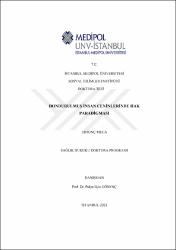| dc.contributor.advisor | Gönenç, Fulya İlçin | |
| dc.contributor.author | Mega, Ertunç | |
| dc.date.accessioned | 2021-09-21T08:21:32Z | |
| dc.date.available | 2021-09-21T08:21:32Z | |
| dc.date.issued | 2021 | en_US |
| dc.date.submitted | 2021 | |
| dc.identifier.citation | Mega, E. (2021). Dondurulmuş insan ceninlerinde hak paradigması. (Yayınlanmamış doktora tezi). İstanbul Medipol Üniversitesi Sosyal Bilimler Enstitüsü, İstanbul. | en_US |
| dc.identifier.uri | https://hdl.handle.net/20.500.12511/8243 | |
| dc.description.abstract | Tez çalışmamızda üremeye yardımcı tedavi uygulamalarında yer bulan yardımla üreme teknolojilerine yönelik dondurularak saklanan bedendışı embriyolar konusu incelenmiştir. Çalışmamızda, öncelikle, bedendışı embriyoların biyolojik ve hukuki statüsü incelenmiştir. İnceleme, bedendışı embriyoların biyolojik statüsünün değerlendirilmesi vasıtası ile hücre, doku ya da başka bir biyolojik yapı olup olmadığı hususunda başlamıştır. Biyolojik statünün tanımlanması aşamasından sonra, bahse konu biyolojik yapıların evrensel ve yerel hukukî düzenlemelerdeki durumları incelenmiştir. Hukukî statü tanımlanması hususunda evrensel genel bir kabulün söz konusu olmadığı saptanmıştır. Kişi ya da eşya olarak nitelendirmelerin gerek hukuk düzeni temelinde gerekse hukukun uygulandığı bölge temelinde zaman zaman ortaya çıktığı saptanmıştır. Ancak, bu biyolojik yapıların dünya genelinde genel yaklaşımda, özel bir statü ile nitelendirildiği, bu nitelendirmenin ise insan onurunun korunması temelinden köken aldığı saptanmıştır. Bedendışı embriyoların dondurularak saklanması aşamasında üreme hücreleri sahipleri ile bahse konu biyolojik yapıyı saklayan tıbbi hizmet sunucusu arasında, tıbbi tedavi sözleşmesinden farklı, yeni bir sözleşme kurulduğu saptanmıştır. Tez çalışmamızın son bölümünde, bedendışı embriyoların dondurularak saklanması aşamasında kurulan sözleşmenin hukuki niteliği değerlendirilmiştir. Her ne kadar bu sözleşme muhafaza amacı güden bir sözleşme tipi olsa da saklanan biyolojik yapıların taşınır eşya statüsünde kabul edilemeyeceği gerçeğinden yola çıkarak, kurulan sözleşmenin TBK'da tanımlanan saklama sözleşmesi kapsamında değerlendirilemeyeceği saptanmıştır. Bedendışı embriyoların saklanması aşamasında saklayan ve saklatan taraf arasında kurulan sözleşme ilişkisinin, vekâlet sözleşmesi hükümleri ölçütlerinde değerlendirilebileceği ortaya konmuştur. Muhafaza edilen biyolojik yapının nicelik açısından sınırlı nitelik açısından ise insan onuru kapsamında değerlendirilir olması, saklama aşamasında standartları belirlenmiş saklama koşullarını talep ettiği sonucuna varılmıştır. | en_US |
| dc.description.abstract | In our thesis, the subject of cryopreserved ecto-uterine embryos was assessed, which is among assisted reproductive technology (ART) procedures within the scope of medically assisted reproduction techniques. Firstly, the biological and legal status of ecto-uterine embryos were examined. The initial assessment was conducted by way of evaluating the biological status of ecto-uterine embryos, on whether a cytological, histological, or some other biological structure is present. After the biological status was determined, the position of the relevant biological structures in global and domestic legislation was assessed. It was found that no global consensus existed on the definition of the legal status. It was determined that certain descriptions such as person or property have occasionally emerged, based on both legal systems and the regions in which they are practiced. However, it was also found that descriptions of these biological structures bear a special status across the globe, rooted in the general understanding of the protection of human dignity. At the stage of the cryopreservation of ecto-uterine embryos, it was determined that a new contract, which is distinct from medical service contracts, is formed between the gamete owners and the medical service provider that is to store the aforesaid biological structure. In the final chapter of our thesis, the legal characteristics of the contract that is formed at the stage of cryopreservation of ecto-uterine embryos were evaluated. Even though this contract has storage as its essential purpose, it was determined that it cannot be regarded as a safekeeping contract as defined in the Turkish Code of Obligations, based on the fact that the biological structures to be stored cannot be regarded as movable goods. It was propounded that the contractual relationship formed between the depositor and the depository at the stage of ecto-uterine embryo storage can be considered with regard to the provisions of mandate contracts. It was concluded that the biological structure to be stored is limited in terms of quantity but is nonetheless within the scope of human dignity in terms of quality, thus warranting storage conditions that comply with certain standards. | en_US |
| dc.language.iso | tur | en_US |
| dc.publisher | İstanbul Medipol Üniversitesi Sosyal Bilimler Enstitüsü | en_US |
| dc.rights | info:eu-repo/semantics/openAccess | en_US |
| dc.subject | Bedendışı Embriyo | en_US |
| dc.subject | Yardımla Üreme Teknikleri | en_US |
| dc.subject | Kriyoprezervasyon | en_US |
| dc.subject | Sözleşmelerin Hukuki Niteliği | en_US |
| dc.subject | Ecto-Uterine Embryo | en_US |
| dc.subject | Assisted Reproductive Technology | en_US |
| dc.subject | Cryopreservation | en_US |
| dc.subject | Legal Characteristics of Contracts | en_US |
| dc.title | Dondurulmuş insan ceninlerinde hak paradigması | en_US |
| dc.title.alternative | The legal characteristics of contracts for ecto-uterine embryo keeping | en_US |
| dc.type | doctoralThesis | en_US |
| dc.department | İstanbul Medipol Üniversitesi, Sosyal Bilimler Enstitüsü, Sağlık Hukuku Ana Bilim Dalı | en_US |
| dc.relation.publicationcategory | Tez | en_US |


















